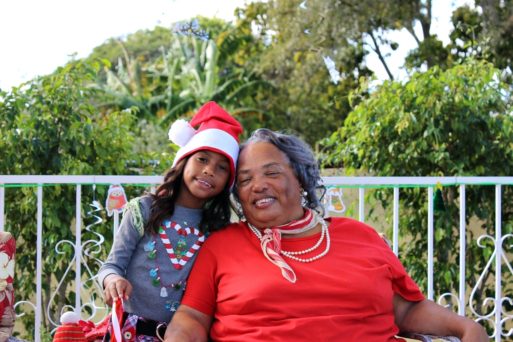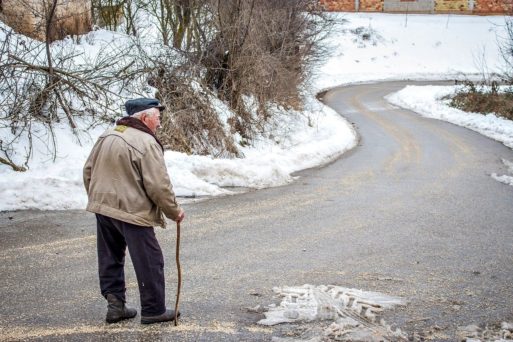
Many grandparents already see their grandchildren less because of the COVID-19 pandemic. They can be devastated when families cancel holiday gatherings.
The holiday season is in full swing, and the COVID-19 pandemic is surging across the country. Many families are curtailing or cancelling holiday plans with older family members and other loved ones who have risk factors for serious cases of the disease. Even when there’s not a pandemic to contend with, the holidays can increase feelings of loneliness and isolation for older adults. This year, feelings of loss and grief around cancelled family gatherings can be especially challenging for seniors who already feel isolated by social distancing and a trend toward living alone.
Since March, the COVID-19 pandemic has made it harder than usual for older adults to spend time with family and friends. COVID-19 is more dangerous for older adults, and the Centers for Disease Control and Prevention recommend that seniors limit all social interactions, including with family members. If seniors do visit with family, everyone should practice social distancing, wear masks and wash their hands frequently. These precautions can sometimes feel stressful and may increase a sense of distance and isolation.
Holiday Gatherings Are Crucial for Connecting with Family
In May, Time Magazine cited a study by NORC at the University of Chicago in which roughly one-third of older adults said they felt “lonelier than usual” during the pandemic. Limiting social interactions with people outside the home can cut off seniors from younger family members. Compared with the rest of the world, older adults in the U.S. are far more likely to live alone or with only a spouse or partner than with extended family, such as adult children or grandchildren. According to the Pew Research Center, only 6% of adults age 60 and older live with extended family, while 46% live with a partner or spouse and 27% live alone.
Many seniors look forward to Christmas, Hanukkah, Kwanzaa and other holiday gatherings as a chance to spend precious time with extended family in person. Cancelling plans can be “devastating” for some older family members, as Lara Salahi writes in the Medford Transcript, and transparency around changing plans is crucial. Dr. Kathryn Zioto of Melrose Wakefield Healthcare says that “the earlier elders know what to expect during the holiday season, the better.”

Over one-quarter of older adults in the U.S. live alone, according to the Pew Research Center. Social distancing due to COVID-19 has increased feelings of loneliness and isolation.
Making Hard Conversations a Little Easier
As many families curtail or cancel holiday gatherings to protect older family members from potential exposure to the coronavirus, they find themselves having difficult conversations. But as Kim Eisenberg, LCSW, told Sharp Health News, these conversations are important, and we can try to make them a little easier by remembering that each family member may have “‘different perspectives, core beliefs, values, and ways of processing and synthesizing information.’”
The strategies below may help engage everyone in a challenging conversation about cancelling holiday plans with older family members.
~Talk about it now. Everyone needs time to adjust when plans change. Talking well in advance of planned events gives seniors a chance to be included in decision-making and to process feelings of loss and grief if events are cancelled. It also gives everyone more time to plan how to celebrate with older family members in a different way.
~Plan the conversation in advance. Schedule the conversation ahead of time and make sure everyone knows what you want to discuss. Your family may want to create guidelines together for talking and listening. For example, you may want to agree that family members speak one at a time or that everyone will pause the conversation for a minute if emotions rise.
~Be prepared to be honest. Before the conversation, think about what you want and why you want it — and encourage every participant in the conversation to do this ahead of time. Understanding your own values and putting them into words can help you know what compromises you’re comfortable or uncomfortable making and may help you feel more heard during the conversation.
~Ask and listen. Ask your older family members what’s important to them about the holiday gatherings. What may be hardest for them if gatherings are cancelled? How might they feel if other family members gather, but they don’t attend? Acknowledge their concerns and feelings, and make a good-faith effort to understand where they’re coming from.
~Be kind even when you disagree. Expect that family members will have differences of opinion. You don’t have to get everyone on the exact same page about the COVID-19 precautions they take. Remember that families want to get together for the holidays because they care about each other, and that’s true even when some family members disagree with a decision to cancel a gathering.
~Make a plan for celebrating safely. The constraints of the pandemic are real, but families can make sure seniors have opportunities to take part in family gatherings in different ways. Family video calls can bring joy. Older family members can contribute to playlists of favorite holiday music that the whole family listens to, and they can share recipes that extended family members make for their own meals.
Challenging conversations arise for every family, whether you’re talking about cancelling holiday plans with older family members due to COVID-19 or making end-of-life choices. Having those conversations in advance can help everyone in the family feel better about decisions you make together.
For many older adults, this holiday season will be the hardest one yet. But with forethought and some hard work up front, you can help older family members still feel the joy of the holiday season.

 Cancelling Holiday Plans with Older Family Members
Cancelling Holiday Plans with Older Family Members


 “Hand to Earth” by Andy Goldsworthy
“Hand to Earth” by Andy Goldsworthy

 Caring for a Dying Loved One? Be Gentle With Yourself.
Caring for a Dying Loved One? Be Gentle With Yourself.














